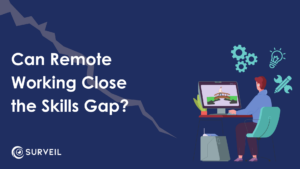As we recover from a global crisis, conversations around the need for skilled digital workers are getting louder. With a widening gap between digital skills requirements and resources threatening to impact economies and development, it’s an issue that affects everybody. So, what can we do?
It’s an uncomfortable fact that the widening digital skills gap is quickly becoming too obvious to ignore. While the likes of widespread digital transformation and technological developments have continued to change how we work and live, interest in IT among GCSE students has dropped by 40% since 2015, with many other age groups are falling behind.
At a time when that transformation has been accelerated by pandemic necessity – and when we’re embracing new technologies to face down the climate challenge – a shortage in digital skills is a dangerous prospect. In fact, researcher RAND Europe predicts that 14 of the G20 countries could miss out on $11trillion of cumulative GDP growth if the skills gap isn’t closed within five years.
However, it isn’t just tackling these large-scale challenges that could put us behind: research suggests that only 60% of Europeans over 16 have the basic digital skills required by executives – while 76% of British employers believed lacking digital skills would directly affect profitability.
In short, we’re struggling not only to keep pace with our own progress, but to fill roles that require the basic skills we’ve started to take for granted.
So, How Do We React?
Discussions around how we prevent the digital skills gap from evolving into a crisis are ongoing, but the consensus remains the same: we need to approach the issue from various angles – and we all have a part to play. But with such a huge challenge ahead of us, where should we start?
Encourage Diversity
Diverse recruitment isn’t just progressive – it’s practical. Companies tapping into a wider range of talent benefit from more creative problem solving, better collaboration, and and the diverse opinions that lead to the best ideas. Meanwhile, an expansive hiring pool means more potential for skilled hires that match requirements. The prevalence of remote working has made this something of a necessity, allowing organisations to hire more widely and reach skilled individuals further afield – filling their own resource requirements with talent people across the globe.
Embrace Automation to Enable Development
While diverse recruitment might help a singular organisation to close their own digital skills gap, we need to simultaneously be thinking about the bigger picture – and that means changing some long-standing habits across industries. In many cases, automating tedious processes frees up employee time – some of which can be reinvested into personal development to ensure that more complex skills are being developed. It’s a small change that can have a significant impact, and also provides the opportunity for businesses to benefit from greater efficiency, cost savings, and – in the case of areas such as joiner, mover, leaver automation – stronger security.
Introduce New Programmes of Learning
When we start to look at the specifics of educational opportunities, we can see that there’s still a long way to go to make digital skills an attractive option for younger people. Microsoft is an active contributor to rewriting this narrative, as evidenced by their recent announcement of an MSc Cloud Computing qualification with the University of Lincoln. The course has been crafted specifically to address a growing need for cloud skills as an increasing number of organisations move from on-premises to the likes of Azure. Meanwhile, it’s important to present digital careers as a viable option in schools, supporting this image with apprenticeships, revamped curriculums, and hands-on learning. As players within the tech space, businesses also have a role to play in education, with mentorship schemes and apprenticeships playing an invaluable role in preparing future generations.
Raise Awareness, Together
Of course, writing about the woes of a digital skills gap will only do so much. As an industry, it’s up to all of us to recognise opportunities to cultivate digital skills and contribute towards closing the gap to ensure that development isn’t stunted as we continue to recover from the recent pandemic.
As a Microsoft Gold Partner, our status comes with the understanding that we’re expected to contribute towards a much grander picture; our commitment to supporting Microsoft’s ambitions for inclusion and diversity through the Partner Pledge is evidenced by our own investment in internal development and education.
There’s a long road ahead of us as we work to close the digital skills gap, and the clock is ticking. Luckily, recent shifts in how we work might just hold the key to making a sizeable change – but only if we also open the conversation to younger generations and make decisive changes to how we approach education. In short, there’s still a chance we can prevent a digital skills crisis, but only by working dynamically, together.
Our Surveil Academy certification has been developed to help partners cultivate vital skills among their sales and technical teams. To find out more about Surveil Academy and becoming a partner, head to our website or get in touch with the team.





